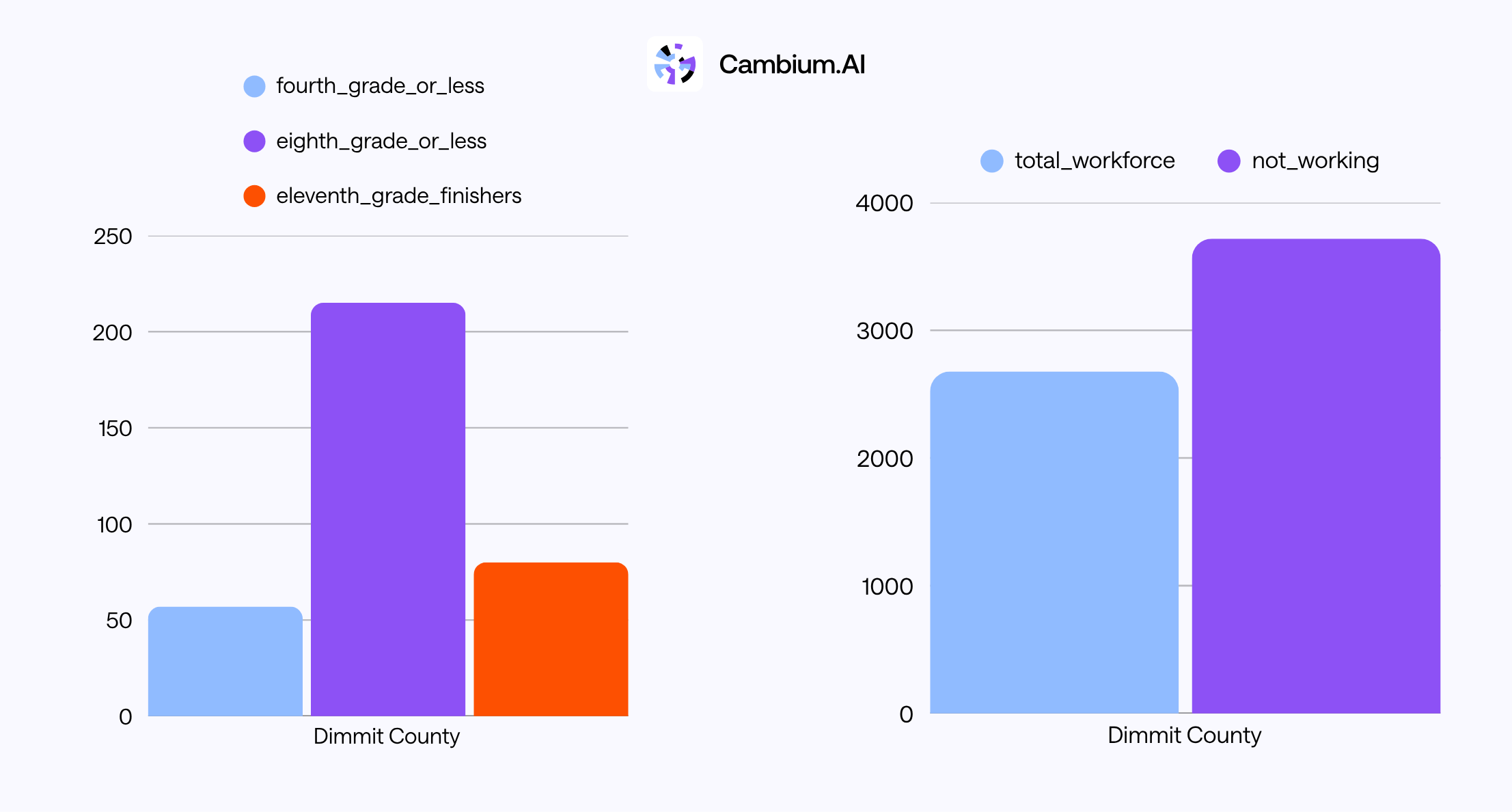Discover Dimmit County, Texas: Population, Economy, and Local Insights
Nestled in the brush country of South Texas, Dimmit County stands as one of the state's quieter, lesser-known rural communities. Often overlooked for larger neighbors like Laredo or San Antonio, Dimmit County possesses a unique charm and an intriguing story rooted in its land, culture, and people. For those seeking to understand small-town Texas at its most authentic, Dimmit County, with a 2023 population of 8,507, presents a compelling subject.
A Snapshot of the Community
According to the 2023 American Community Survey data, Dimmit County's population of 8,507 defines it as a tight-knit community where people often recognize each other by name. Life moves at a different pace here, with generations growing up, working, and raising families in homes that line quiet country roads or cluster around the local schools and churches of Carrizo Springs, the county seat.
Demographics and Age
One of the notable features of Dimmit County is its age structure. The county has a modest senior population, with 8 men and 81 women over the age of 85. This number illustrates the endurance and rootedness of its older residents, many of whom have deep ties to the land and community institutions. At the same time, the wider age distribution suggests a county with both young families and elderly residents, a signal of stability amid rural out-migration trends common in other regions.
Diversity and Heritage
Dimmit County is marked by a complex racial and ethnic tapestry. Out of its total 8,507 residents, 848 identify as “Some Other Race Alone.” Even more remarkably, 4,769 people identify with “Two or More Races Including Some Other Race,” showcasing the rich blend of cultures and ancestries that have shaped this region. The area’s strong Hispanic and Latino heritage also infuses everyday life—reflected in language, festivals, culinary traditions, and family networks.
Economic Landscape
Income
The latest census figures highlight that Dimmit County is a place of modest means. The median household income here stands at $33,409, while the per capita income is around $20,919. These numbers fall well below the state and national medians, painting a picture of a rural economy that, while resilient, faces ongoing challenges.
Employment
The labor force totals 2,677 people, all of whom are classified as part of the civilian labor force. Out of these, 183 are unemployed and actively searching for work. At the same time, 3,717 people over the age of 16 are not in the workforce, perhaps reflecting retirees, students, homemakers, or others not engaged in formal employment.
Agriculture and oil have long been the mainstays of Dimmit County’s economy, although, like many agricultural communities, the area has seen shifts over the years. The Eagle Ford Shale oil boom and its bust cycle impacted employment and housing in recent decades. Yet through these ebbs and flows, the people of Dimmit County continue to adapt and persevere.
Housing and Living Environment
Housing Stock
Dimmit County features 3,010 housing units, highlighting a landscape filled with affordable homes and modest neighborhoods. Of special note are its diverse housing types:
- 205 units are renter-occupied buildings with 3 or 4 apartments.
- The county still features a significant number of mobile homes, with 220 renter-occupied units classified as such.
- Only 63 renter-occupied units are found in buildings with 50 or more apartments, illustrating the rural, spread-out nature of the community.
The abundance of mobile homes reflects not only affordability but also adaptability, as residents seek solutions that meet their needs in a region far from sprawling urban infrastructure.
Quality of Life
The lower cost of living relative to urban areas, combined with an abundance of space and tranquil surroundings, makes Dimmit County attractive for those seeking a slower pace of life. With open skies, star-filled nights, and little traffic congestion, residents enjoy a distinct peace that can be hard to find in larger cities.
Education
Educational attainment in Dimmit County reflects the ongoing efforts to bolster opportunity despite economic hurdles.
- 57 adults have completed at most a fourth-grade education.
- 215 residents have achieved education levels no higher than eighth grade.
- 80 have completed the eleventh grade.
While many families value education for their children, these figures indicate challenges associated with generational poverty, limited access, or the need for youth to join the workforce early. Nevertheless, the county continues to invest in its schools, with dedicated teachers and involved families supporting students on their educational journeys.
Community and Culture
Life in Dimmit County revolves around family, faith, and tradition. Local festivals, church gatherings, school sporting events, and community service projects provide regular opportunities for residents to come together. The town of Carrizo Springs, the beating heart of the county, showcases this spirit with its annual events and vibrant community life.
The community’s Latino roots shine through in local cuisine—think homemade tamales, chili con carne, and barbacoa feasts shared over family tables. Musical heritage, folk dancing, and the Spanish language are all regular features of daily interaction.
Recreation and Natural Beauty
Dimmit County is blessed with the beauty and bounty of South Texas brush country. Outdoor enthusiasts can find ample hunting, fishing, and bird-watching opportunities, with landowners often leasing property for seasonal adventures. The region’s scenery, punctuated by mesquite, cacti, and vast ranchlands, offers a chance to disconnect and recharge.
Challenges and Opportunities
Like many rural counties across the United States, Dimmit County faces challenges: attracting new investment, reversing population decline, and providing modern amenities in a rural setting. The relatively high percentage of households with lower educational attainment underscores the importance of investing in both schools and adult education programs.
Yet this area’s quiet strength lies in its enduring community bonds, persistence, and pride. Local leadership, combined with state and federal initiatives, continues to seek ways to build opportunity and encourage young people to stay and invest in their hometown.
Conclusion: Looking Ahead
Dimmit County stands as a testament to the power of community and resilience. Its modest population, rich heritage, and storied landscapes invite visitors and future residents alike to experience an authentic side of Texas that is often overlooked by the glossy brochures.
For those searching for a slice of real Texas—where neighbors lend a hand, traditions run deep, and wide-open spaces give room to breathe—Dimmit County deserves a closer look. As the county navigates the challenges of economic development and demographic change, its greatest asset remains the people who call it home. In quiet places like Dimmit County, the story of rural America continues to unfold, one family and one generation at a time.
All data referenced in this post was sourced from the 2023 American Community Survey (ACS), providing a statistical snapshot of Dimmit County life


.png)
.gif)